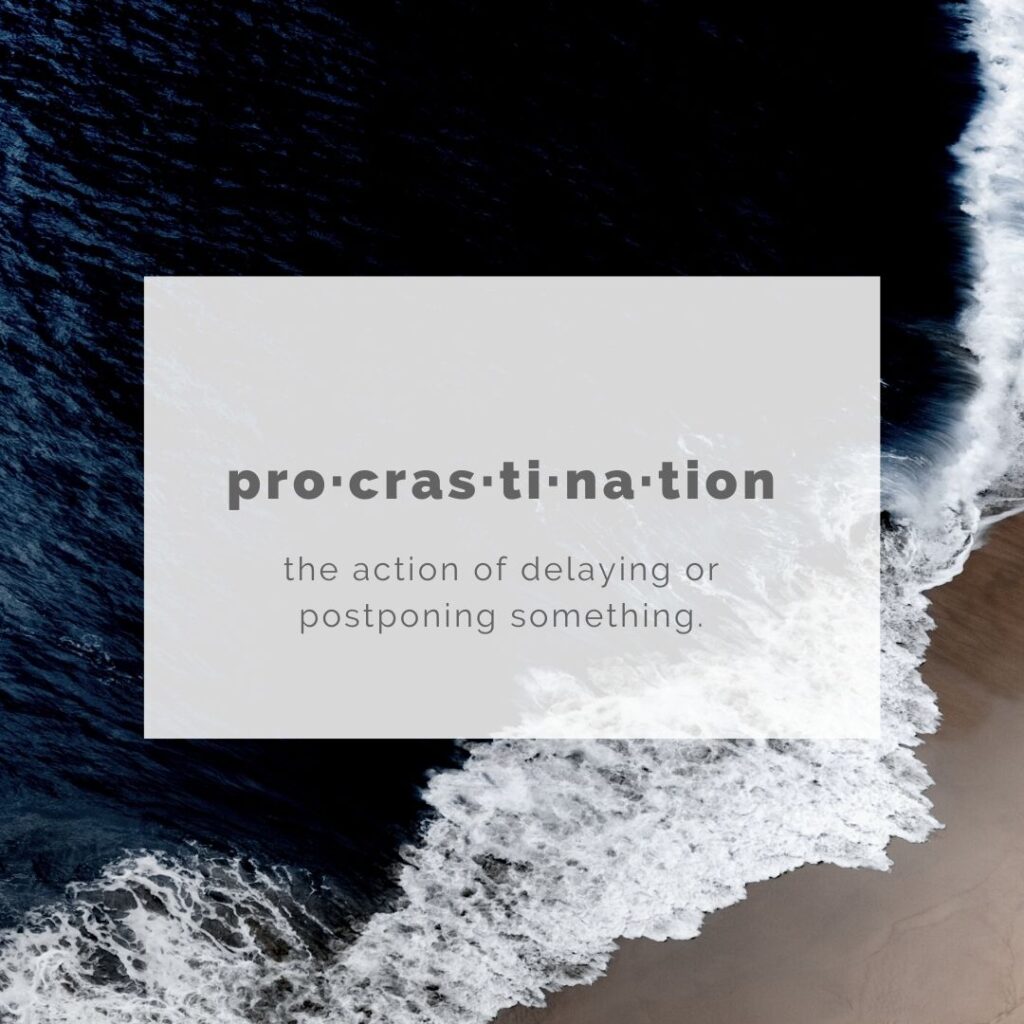Procrastination, and why being busy is not the same as being productive.
Sometimes, we spend hours working without stopping, and at the end of the day, we cannot check a single task in our to-do list. Has it happened to you?
We idolize being busy, but busyness does not translate into successful productivity. The keyword when we talk about unproductiveness is PROCRASTINATION.
But what’s Procrastination?
Procrastination is acting against your better judgment when you delay or postpone a task or set of tasks. It is when you do one thing even though you know you should do something else.
Alan Lazaros, from the HyperConscious Podcast, quotes James Clear often: “You will not rise to the level of your ambition, you will actually fall to the level of your systems.”

Reasons Why We Procrastinate
Now that we are mostly working from home, we know we have to write that blog post, make that sales call, or update our website, but we don’t. It is not because we are lazy. On the contrary, we usually postpone a task that is VERY IMPORTANT to us, either because it is difficult, urgent, challenging, or because it requires meticulous performance, or a lot of our time, or all of the above combined.
Our brain values long-term benefits, but it values immediate gratification in the present moment.
The real problem is not doing the work.
It’s starting.
How You Can Stop Procrastinating Right Now
Use temptation bundling.
Bring future rewards into the present with temptation bundling. That is, “bundling a behavior that is good for you in the long-run with a behavior that feels good in the short-run.“
The basic format is: Only do [thing you love] while doing [thing you procrastinate on]. For example, only listen to your favorite podcasts while exercising (my favorite podcasts to listen to while I exercise).
Reduce the size of your habits.
If it’s easy for you to start, then you will be less likely to procrastinate. The momentum will help you carry on. In this case, just get started. Divide the big task into small ones. If you have to write a document, opening Word or Pages can be that first micro-task.
You can also use the 2-Minute Rule, which says, “When you start a new habit, it should take less than two minutes to do.” When you start doing something, it’s easier for you to continue doing it.
Use the Pomodoro Method, and commit to 25 minutes without distractions to accomplish your micro-tasks. When you can concentrate, you will no longer want to stop there.
Be Consistent
Mastery requires focus and consistency. To turn productivity into a long-term habit, we need a system for deciding what is essential and what we should work on first.
A chaotic mind often leads us to unproductivity. Write down all your pending tasks. Get them out of your head, so they no longer occupy space on your mind. In technological terms, we would say: free up your RAM.
The Ivy Lee Method is a great productivity system, and it is so simple that it just works:
- At the end of each workday, write down the six most important things you need to accomplish tomorrow. Do not write down more than six tasks.
- Prioritize those six items in order of their true importance.
- When you arrive tomorrow, concentrate only on the first task. Work until the first task is finished before moving on to the second task.
- Approach the rest of your list in the same fashion. At the end of the day, move any unfinished items to a new list of six tasks for the following day.
- Repeat this process every working day.
This method fosters single-tasking. We might believe multi-tasking and busyness are synonyms of success and productivity. Focus on a single task, and you will have better results.
Use Visual Reminders
You can overcome procrastination by using visual cues to trigger your habits and measure progress. Using a calendar, or a journal, to track your progress will help you take action
When we perceive that we have made progress towards a goal, we will commit more to it. Behavioral economics studies refer to this as the Endowed Progress Effect.
Consistency is a critical component of success. A visual reminder will prompt you to take action and motivate you to finish the task. Seeing your progress triggers your next productive step.
- The Paper Clip Strategy to beat procrastination day-after-day,
- The Seinfeld Strategy to maintain consistency over more extended periods.
Final Words on Procrastination
The faster you complete a productive task, you will feel more productive. Also, do the most important thing first each day and let the momentum of the first task carry you into the next one.
Sometimes, many of our tasks depend on third parties for their fulfillment. And when we get ready to fulfill that task, we realize we have to wait for someone else’s call, for someone else’s message, for someone else’s confirmation. The point is that, for one reason or another, we have to put that task on hold. Be proactive. Making plans is okay, but life happens.
For more on creating habits, decision making, and continuous improvement that will lead to peak performance, check Atomic Habits .
Leave us in the comments which one and if you have any advice to improve productivity.

